
Gospel Reading: Matthew 2:1-12
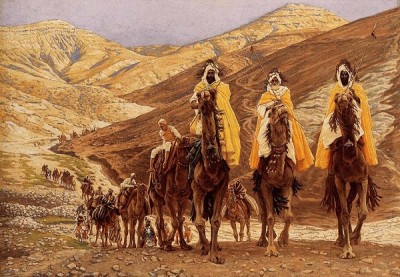 vs.1 After Jesus had been born at Bethlehem in Judaea during the reign of King Herod, some wise men came to Jerusalem from the east.
vs.1 After Jesus had been born at Bethlehem in Judaea during the reign of King Herod, some wise men came to Jerusalem from the east.
vs.2 “Where is the infant king of the Jews?” they asked. “We saw his star as it rose and have come to do him homage.”
vs.3 When King Herod heard this he was perturbed, and so was the whole of Jerusalem.
vs.4 He called together all the chief priests and the scribes of the people, and enquired of them where the Christ was to be born.
vs.5 “At Bethlehem in Judaea,” they told him, “for this is what the prophet wrote:
vs.6 And you, Bethlehem, in the land of Judaea, you are by no means least among the leaders of Judah, for out of you will come a leader who will shepherd my people Israel.”
vs.7 then Herod summoned the wise men to see him privately. He asked them the exact date on which the star had appeared,
vs.8 and sent them on to Bethlehem. “Go and find out all about the child,” he said “and when you have found him, let me know, so that I too may go and do him homage.”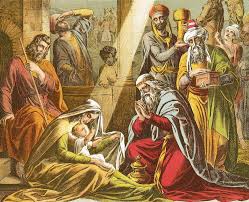
vs.9 Having listened to what the king had to say, they set out. And there in front of them was the star they had seen rising; it went forward and halted over the place where the child was.
vs.10 The sight of the star filled them with delight,
vs.11 and going into the house they saw the child with his mother Mary, and falling to their knees they did him homage. Then, opening their treasures, they offered him gifts of gold and frankincense and myrrh.
vs.12 But they were warned in a dream not to go back to Herod, and returned to their own country by a different way.
********************************************************
We have three sets of homily notes to choose from.
Please click on the one required.
1. Michel de Verteuil Lectio Divina Year B
2. Thomas O’Loughlin, Liturgical Resources for Year C (Mark
3. John Littleton, Journeying through the Year of Luke.
***************************************************
Michel de Verteuil
Lectio Divina, The Year of Mathew
www.columba.ie
General Comments
In the Christmas story as told by St Luke, the Word made flesh manifests himself to the shepherds; in St Matthew’s version, he manifests himself to the wise men from the East. Although at first sight the two stories seem different, they are in fact basically alike – as you will discover when you meditate on each passage – since there is only one God and he has one way of relating with us.
For this feast, then, make the journey with the wise men, as you did with the shepherds on Christmas Day and on January 1st.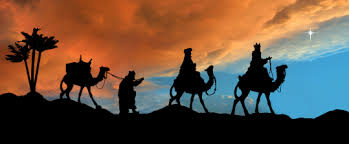
The story is told in clearly defined stages, and you will find that each of these stages will touch you in your meditation, so that you need not include the entire story in order to do a good meditation.
Verses 1 and 2 tell us of the journey from “the east” to Jerusalem, and the symbolism of the first searching which takes us some of the way, before we get lost and have to resort to a religious center.
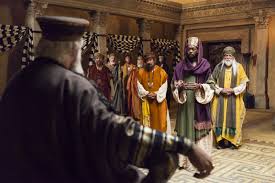 In verses 3 to 9 we have the meeting between the wise men and Herod – very dramatic, and so true to experience. You can read these verses from the point of view of the wise men, so humble and open to learning from religious leaders, even though these have bad motives; or from the point of view of Herod, typical of ourselves when we are in a position of authority and privilege and become insecure at the mere thought of a new religious insight.
In verses 3 to 9 we have the meeting between the wise men and Herod – very dramatic, and so true to experience. You can read these verses from the point of view of the wise men, so humble and open to learning from religious leaders, even though these have bad motives; or from the point of view of Herod, typical of ourselves when we are in a position of authority and privilege and become insecure at the mere thought of a new religious insight.
In verses 10 and 11 we have the touching story of all moments of grace – the joy of recognition, the sense of homecoming, the simplicity of the presence of God. The mention of the “treasures” is clearly meant to convey the arrival of other cultures doing homage to Jesus.
Verse 12 is very significant, indicating the new-found freedom of the believers.
Prayer Reflection
Lord, there comes a point in our lives when we finally discover
what we want to give our whole lives to:
* a cause like racial equality, community development, women’s rights;
* a spirituality which combines union with God and social involvement;
* the religious life or the priesthood;
* contemplative prayer.
We look back on the long journey that brought us to this point,
from the time we knew in some vague way that we wanted to change our ways
– like the wise men seeing a star as it rose and deciding to follow it.
Then, as it always seems to happen on a spiritual journey,
we lost sight of the star and drifted aimlessly for some years,
until we realized that the only sensible thing to do was to get help.
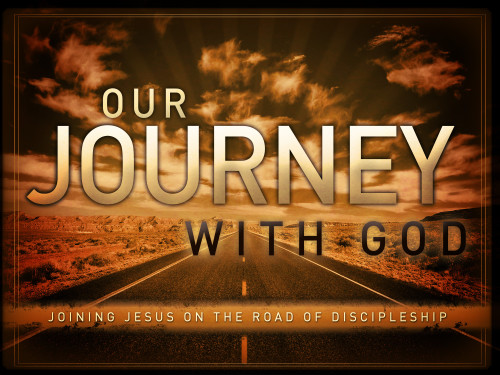
So we went to our religious leaders,
and though they were rather confused themselves,
they put us back on the right track and the old enthusiasm returned.
The last part of the journey went quickly:
suddenly we knew that we had found what we had been looking for,
and it was like coming home, so that we went into the house,
fell on our knees and opened our treasures.
Thank you, Lord, for guiding us every part of the way.
Lord, it is strange how we become attached to positions of privilege
* as parents or teachers;
* occupying a position in the Church;
* accepted as one of the better educated members of our little circle.
When people come forward who are from a different background,
or who are asking new questions,
we are perturbed, as Herod was when the wise men came to Jerusalem.
We reflect on what to say, and may even give them good advice,
but deep down our main concern is
that we should continue to feel secure where we are.
No wonder those whom we help do not come back to us
but return to their country by a different way.
Lord, for many centuries now the Church has been European.
We thank you that in our day people of other cultures are looking for Jesus
because they have seen a star out in the east.
Naturally, we are perturbed by all these foreigners,
and so is the whole of Jerusalem, for they will bring changes to the whole Church,
and we will lose our special status.
So, though we give them the right instructions,
we tell them that once they have discovered Jesus
they must come back and tell us exactly what they have found.
But you are guiding them, Lord, and when they come to Jesus
they will open the treasures of their own cultures.
Furthermore, you will reveal to them that there is no need to come back to us,
and they will make their own way home.
Lord, we sometimes think that we must spend plenty of money
to make Jesus more attractive, or that we must be very learned
so that our preaching of him can draw many to him.
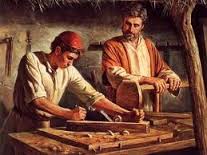
Jesus learning his trade
But wise men are looking for an infant king,
and the Scriptures say that he will come from Bethlehem,
the least among the leaders of Judah,
because people are tired of great kings who dominate them.
But if they go into a simple house and see the child Jesus with his mother Mary,
even as they fall on their knees and do him homage
they will feel comfortable to open their treasures
and offer him gifts of gold, frankincense and myrrh.
Lord, we look today for instant results and for the “quick fix” in all things,
so that we end up looking for instant spiritual growth as well.
But before we can see Jesus and fall on our knees and do him homage
we have to make a long journey from the east.
We have to follow a star, lose it and discover it again many times,
until finally it halts over the place where he is.
****************************************************
Thomas O’Loughlin,
Liturgical Resources for Year C (Matthew)
www.columba.ie
Homily Notes
1. This feast cannot escape the links with the colourful exotic figures in the crib and their gifts. However, the task of the preacher is to draw attention to those aspects of the mystery of the incarnation that Matthew wished to highlight by introducing the story of the eastern visitors into his infancy narrative.
2. In a nutshell, the infancy narratives in both Luke and Matthew should be seen as ‘identity cards‘: they tell us about who Jesus is, before we hear anything about what he did. But they approach the question of identity using the forms of historical narrative rather than abstract theological categories. Once this is stated then each of the episodes within these narratives, such as the visit of the magi, must be seen as expressing various aspects of the mysterious identity of the Anointed One. So what does this story tell us about Jesus and our faith in him?
3. That Jesus was the one for whom Israel waited over the generations of promise was established by Matthew at the very beginning of his gospel in the genealogy. However, there was also a strand of messianic faith that the Christ would not only bring salvation to Israel, but to all ‘the nations’, the whole of humanity. We find this faith in the oracle in Zechariah: ‘Thus says the Lord of hosts: In those days ten men from nations of every language shall take hold of a Jew, grasping his garment and saying, “Let us go with you, for we have heard that God is with you'” (8:23). Now with the arrival of these magi, representatives of the nations, this prophecy is fulfilled and one more aspect of the nature of Jesus is revealed. Jesus is the one who is awaited by all nations.
4. The message of the Christians is that God has sent us his Son in Jesus Christ; today we rejoice that this mystery of God-with-us is not something that is confined to a select few, but something that is for all humanity.
5. Matthew is careful to show that while God reveals the Anointed One’s coming by a star, it is also something that comes through the magi’s own deep searching. In this Matthew’s gospel is very different from Luke’s gospel where the angel tells the shepherds who has come and what it means and what to do, and then they do it. In Matthew we have professional searchers who realise that there is a greater mystery beyond their present conditions and then set out to find it. They follow the evidence, they at first come to the wrong conclusion when they go to Herod’s court, and the truth only becomes dear when they find themselves in the presence of Jesus. The Christ, and his gospel, is thus seen as the fulfillment of human longings and of the human search for the truth – not as something imposed on humanity from outside that is destructive of human desires and creativity. Alas, we Christians often present the gospel in just such a negative way.
6. To celebrate this feast is to rejoice that God’s love has become available to us and that that love invites a response from us: to offer to Truth himself all our human talents.
*****************************************************
3. John Littleton,
Journeying through the Year.
www.columba.ie
Introduction to the Celebration
Today we recall the strange and exotic visitors who went to greet the infant Jesus. They remind us that in a myriad of ways the Christ beckons all of us to gather with him and offer thanks to the Father.
Gospel Reflection
For many Christians, the Feast of the Epiphany (which is also known as Little Christmas in Ireland) marks the end of the Christmas season. Yet the Epiphany is at the heart of the Christmas message. The word ‘epiphany’ means ‘manifestation’ or ‘showing’. Fundamentally, the Christian vocation is to show Jesus and his glory to the world. The Epiphany acknowledges that Jesus Christ, the newborn baby, is the Saviour of all people.
During the Christmas season, we reflect on what it means to believe that the Word became flesh and lived among us. God has chosen to live among us, hh people, in the person of Jesus Christ, our Lord anc Saviour, who saves us from the justly deserved consequences of our sins.
This is why we celebrate Christmas. All other activities associated with Christmas — for example, the exchange of gifts, the holidays from school and work. the visits to family and friends — are secondary. The real wonder of Christmas is not just that God becamc human in and through his Son, Jesus Christ, but thaT Christ, through his Church, continues to be present in our world.
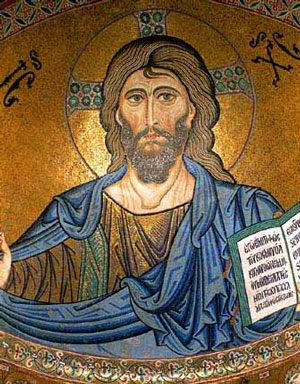
God’s Word, Son and Revelation
Christmas and the Epiphany challenge us to renew our appreciation of the commitment God has made to us by becoming human. In the person and life of Jesus Christ, the Word made flesh, God has demonstrated beyond all doubt how much he loves us and shares his life with us. God shares his life with us especially through the Church and the sacraments. In the person and life of Jesus Christ, God has embraced human nature completely and he has become one with it. This is the mystery of Christmas and it remains true for all time and for all God’s people everywhere.
The Feast of the Epiphany invites us to consider once again the real meaning of Christmas and to respond accordingly. The wise men, in presenting Jesus with gifts of gold, frankincense and myrrh, acknowledged him as Saviour of all people. The feast invites us to ask: what gift can we present to Jesus that acknowledges him as our Saviour?
Surely the most appropriate gift is striving to live a life that imitates his teaching and example. Therefore, the Epiphany is an ideal time to reflect on the practice of our Christian faith so that, during the coming year, we will ‘show’ the world the glory of the Saviour who has redeemed us from sin and who gives us life through his Church and the celebration of the sacraments.
For meditation:
We saw his star as it rose and
have come to do the king homage. (Mathew 2:2)
***************************************************************
The following Gospel reflection is available in Reflections on the Weekday Readings My Words Will Not Pass Away by Martin Hogan and published by Messenger Publications c/f www.messenger.ie/bookshop/
I came across a sentence in a book recently that caught my attention, ‘We belong to an age when it is easier to see the darkness of the night than the bright spots that shine in the midst of the darkness.’ As followers of a risen Lord who declared himself to be the light of the world, we are always looking for the bright spots that shine in the midst of the darkness. They are there to be seen for those who are searching for them.
In his parables Jesus suggested that the kingdom of God, the powerful presence of God, is often a hidden presence among us. It is like the seed growing secretly underneath the earth. It does not come with dramatic flashes of lightning. Its presence is so subtle at times that we can be tempted to think that darkness is prevailing over the light of God’s kingdom. Yet the small bright spots of God’s benevolent presence are shining in the darkness if we have eyes to see.
On this feast of the Epiphany, the Magi enter the Christmas story and appear in our cribs. They were probably professional astrologers from Persia who were used to searching the night sky. They were pagans. They had no access to the Word of God in the Jewish Scriptures. Yet they had the infinity of the night sky, which fascinated them, and they had searching spirits and enquiring minds. They were open to the ways that God was drawing them to himself. They were attuned to God’s light in the darkness. When they saw the small light of a new star in the midst of a dark night sky, it spoke to their searching spirits and their enquiring minds. As the star moved, they followed it. They left their familiar surroundings and set out on a journey of hope. They sensed that this star would lead them towards a special manifestation of God’s presence, the infant King of the Jews.
The Magi are patrons of those who see signposts to God that others very often do not see. They encourage us to be alert to the signs of the Lord’s presence in the darkness, to the ways that the Lord is drawing us towards himself. Today’s feast invites each of us to ask, ‘Where is the star that is guiding me towards Bethlehem, through which I am being called to set out on a journey towards Emmanuel, God-with-us?’ Moving towards Emmanuel, the Light of the World, is the journey of a lifetime; it is never over. Even when the Magi reached Bethlehem, their journey wasn’t over. We are told that having worshipped Emmanuel, they returned to their own country by a different way. Having given their precious gifts to the child, they set out on a new journey to share the treasure they had received.
If we are attentive to the star that the Lord sends us, if we are open to the ways he is drawing us, we will have our own Bethlehem moments too, times when we will have a special sense of the Lord’s presence to us, a wonderful awareness of the Lord’s love for us, a grateful experience of the Lord’s light in the darkness. Such moments might inspire us to offer him what is most precious to us, the gift of our lives. Such Bethlehem moments are never the end of our journey, just as Bethlehem wasn’t the end of the Magi’s journey. They launch us on a new journey. In those moments when the Lord touches our lives in a special way, we often sense the call to share what we have received. Graced by the Lord’s light at such times, we go forward carrying his light to others. Like the Magi, once we have encountered the light of the Lord, we will often see a different and better route for our lives.
The Lord will often lead us to himself by a variety of stars. Then, having drawn us to himself, he sends us out on another journey, to shine as his stars to others, to become ourselves that bright spot shining in the midst of the darkness. The magi’s journey to Bethlehem and their different journey away from Bethlehem reflects the twofold pattern of our own lives as the Lord’s disciples. The Lord keeps calling us to Bethlehem, to an ever deeper encounter with Emmanuel, the Light of the World, and he then sends us out as his light-bearers to others, especially to those who find themselves in darkness.
The ominous presence of Herod in the gospel reading reminds us that there are always dark forces in our world working to eliminate the presence of the Lord’s light. Those forces will often seek to undermine our efforts to journey towards the light of Bethlehem and to journey away from Bethlehem as light-bearers. Yet Herod could not stop God’s epiphany. God’s light shone in Bethlehem and Herod’s darkness could not overcome it. That remains true today. The Herods of this world can never stop God’s continuing epiphany among us. The bright spots of the Lord’s presence are stronger than the darkness and will, eventually, overcome it.
****************************